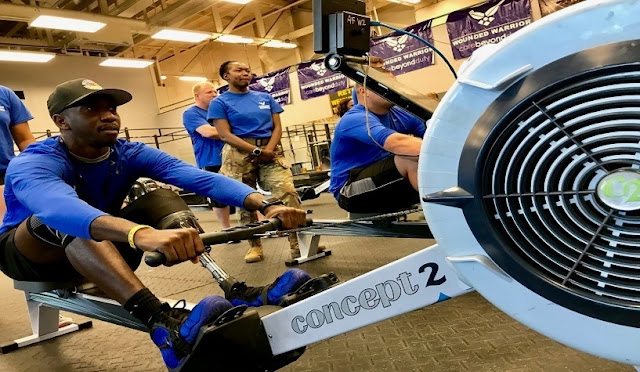Wounded combat vet takes trek on handcycle from ground zero to St. Pete’s
1,500 miles; eight states; hundreds of cities.
These are the statistics that accompany a trip from New York City to St. Petersburg, Florida. According to Google maps, that takes most vehicles – assuming the driver is doing the speed limit – approximately 17 hours and eight minutes.
Ricky Raley, a retired infantryman from the Indiana National Guard, paralyzed from the waist down, is wrapping up the final leg of this journey – done completely on a handcycle – on Aug. 25.
Raley deployed to Iraq in support of Operation Iraqi Freedom in 2007. During a convoy, his vehicle was struck by an improvised explosive device. Raley suffered traumatic brain injuries and was later awarded the Purple Heart.
Months after returning to the United States, Raley was involved in a near-fatal motor vehicle accident. The truck he was riding in flipped several times, and Raley was ejected. The truck rolled over him and crushed his back, rendering him paralyzed.
Following his accident and subsequent diagnosis, Raley said he didn’t have the option to wallow in self-pity – his wife was four-months pregnant with their first child. With her tough support and the strong desire to set an example of a good man to his son, Raley persevered and begun to conjure up ways he could remain active.
“I was 23,” said Raley. “I knew I still wanted to remain active, so I started looking into different avenues. That’s when I found adaptive sports. It brought about a sense of community. When I was there handcycling with everyone else, I felt like I belonged and I wasn’t just someone in a chair.”
The comraderies built around those he played adaptive sports with was reminiscent of the bond he built with those he deployed to Iraq with.
While he still struggled with the physical effects of the accident, Raley said his invisible scars took a larger toll.
“The trauma from being paralyzed was nowhere near the isolation I felt from the traumatic brain injury and the mental cognition issues I was having,” said Raley.
Raley found hope in the Boot Campaign – a nonprofit organization aimed to assist veterans with holistic care for TBIs, post-traumatic stress disorder, and insomnia.
His stalwartness and fervor to help other veterans who suffer from afflictions from war like he did, led him to where he is today – at Hunter Army Airfield, Georgia to meet with active-duty Soldiers with the 3rd Infantry Division and 75th Ranger Regiment, one of many installations Raley is visiting along his journey to relay his message.
“Coming here to Savannah and Hunter is a full circle for me,” said Raley. “Before I left for Iraq, my unit mobilized at Fort Stewart, and we flew out of Hunter.”
He was escorted into the installation by the Savannah Police Department and behind him trailed dozens of local motorcyclists and touring cyclists to show their support for him.
A patriotic celebration awaited Raley, who was met with music played by the 3rd ID Band and waves of applause by Soldiers, veterans, local community members, and key leaders from the Marne Division.
Lt. Col. Kenneth Dwyer, Hunter Army Airfield garrison commander, spoke on his awe of Raley and his mission to raise awareness for the mental battles Soldiers and veterans face.
“A lot of people would have given up,” said Dwyer. “They would have been okay with just getting by and feeling sorry for themselves. You have all heard the saying, ‘when life gives you lemons, make lemonade’.”
“Ricky took lemons, and he learned to bake a chocolate cake,” said Dwyer.
Raley took to the stage to address the audience – primarily the Soldiers – to drive home his message.
“We’re all just people,” said Raley. “No matter what your life experience is, whatever your MOS [military occupational specialty] was, we all have these experiences that shape us. Use that to help the person next to you.”




Comments
Post a Comment